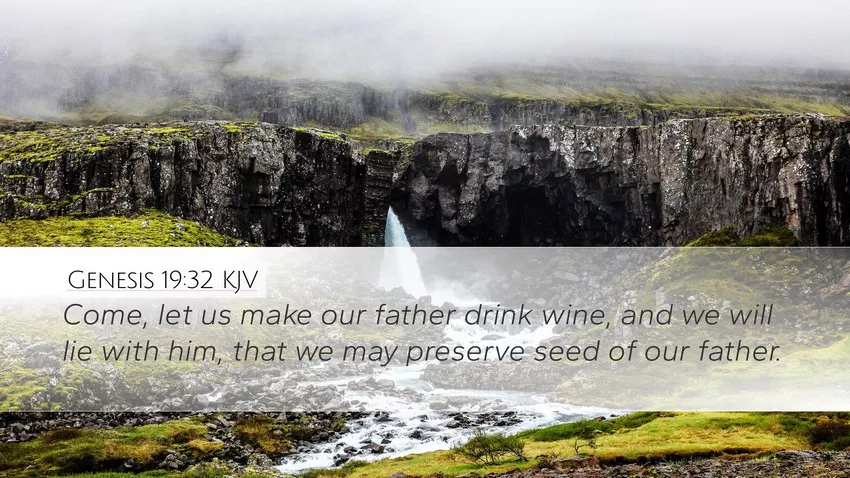Read the Daily Bible Verse – Genesis 19:32 To Strengthen Your Spiritual Journey.
Genesis 19:32 is a complex and challenging verse within the Bible. It forms part of the narrative following the destruction of Sodom and Gomorrah and the subsequent isolation of Lot and his daughters. The verse reads: “Come, let us make our father drink wine, and we will lie with him, that we may preserve the lineage of our father.” This passage is critical for understanding the broader implications of Lot’s story and the ethical dilemmas faced by his daughters. This article will provide a comprehensive analysis of Genesis 19:32, exploring its context, meaning, applications, and relevance for both ancient and contemporary readers.
The Context of Genesis 19:32 KJV
To grasp the meaning of Genesis 19:32, it is essential to examine its placement within the broader narrative of Genesis 19 and the surrounding chapters:
Destruction of Sodom and Gomorrah: Genesis 19 recounts the divine destruction of Sodom and Gomorrah due to their wickedness. Lot and his family are spared and escape to Zoar but later flee to the mountains due to fear (Genesis 19:24-30).
Lot’s Daughters’ Decision: After relocating to a cave in the mountains, Lot’s daughters face the reality of being isolated without prospects for marriage or offspring. This fear of losing their family lineage leads them to make a troubling decision.
Genesis 19:32 is pivotal as it introduces the plan devised by Lot’s daughters to preserve their family line, which involves an incestuous act with their father. This action is not only morally troubling but also highlights the desperation and fear of the daughters as they confront their circumstances.
The Genesis 19:32 Meaning
Genesis 19:32 reveals several layers of meaning:
Desperation and Fear: The daughters’ plan to make their father drunk and lie with him reflects their desperation and fear of extinction. They believe that preserving their family lineage is crucial despite the morally questionable means they employ.
Moral Decline: This verse illustrates the moral decline resulting from the traumatic experiences and isolation Lot and his daughters face. Their actions are driven by a sense of hopelessness and fear rather than ethical considerations.
Cultural Context: In the ancient Near Eastern context, preserving family lineage was highly valued. The daughters’ actions, though ethically unacceptable, reflect the extreme lengths to which individuals might go to ensure their family’s survival.
See Also: What Does Genesis 19:31 Mean?
Genesis 19:32 Application in Life
The application of Genesis 19:32 can be challenging due to its troubling nature. However, it offers valuable lessons:
Understanding Human Desperation: The verse provides insight into the lengths to which individuals might go when faced with extreme fear and desperation. It encourages readers to understand the human condition and the impact of traumatic experiences on behavior.
Ethical Decision-Making: This passage serves as a cautionary tale about the importance of maintaining ethical standards even in dire situations. It highlights the need for moral integrity and the consequences of abandoning one’s principles.
Addressing Isolation and Despair: Genesis 19:32 underscores the impact of isolation and despair on decision-making. It invites readers to reflect on how they address feelings of loneliness and desperation and seek healthy, ethical solutions.
Comparison with Other Biblical Texts
Comparing Genesis 19:32 with other Biblical texts can provide additional insights:
Genesis 38:6-30: The story of Judah and Tamar involves a similar theme of preserving family lineage through unconventional means. While the circumstances differ, both narratives deal with complex moral decisions related to family preservation.
Leviticus 18:6-18: This passage outlines the prohibitions against incestuous relationships. The actions of Lot’s daughters are in direct violation of these laws, highlighting the moral and ethical boundaries set by later Biblical laws.
Ruth 4:13-17: The story of Ruth and Boaz demonstrates a positive approach to preserving family lineage through righteous means. Unlike Lot’s daughters, Ruth and Boaz’s actions align with ethical and cultural standards.
Modern-Day Relevance
Genesis 19:32 remains relevant today, particularly in the context of ethical decision-making and human behavior:
Understanding Trauma and Isolation: The passage provides a lens through which to understand the effects of trauma and isolation on individuals. It can help modern readers empathize with those facing extreme circumstances and encourage compassionate support.
Ethical Challenges: The story raises questions about the limits of ethical behavior in desperate situations. It invites contemporary readers to consider how they would handle moral dilemmas and the importance of maintaining ethical standards.
Cultural and Moral Reflection: Genesis 19:32 encourages reflection on cultural values and moral principles. It challenges readers to consider how cultural pressures and personal fears influence their decisions and actions.
Conclusion
Genesis 19:32 is a poignant and troubling verse that offers deep insights into human behavior, desperation, and moral decision-making. By examining its context, meaning, and applications, readers can gain a greater understanding of the complexities faced by Lot’s daughters and the broader implications for ethical behavior. The verse serves as a powerful reminder of the impact of fear and isolation on moral choices and the importance of maintaining integrity even in challenging circumstances.
Genesis 19:32 Commentary
Commentaries on Genesis 19:32 often focus on the disturbing nature of the verse and its implications. Scholars highlight that the daughters’ actions reflect a tragic combination of fear, desperation, and a distorted sense of duty to preserve their family line. The commentary frequently emphasizes the contrast between this narrative and later Biblical laws, which explicitly condemn incestuous relationships. The verse is seen as a dramatic example of how extreme circumstances can lead to morally compromised decisions and serves as a cautionary tale about the importance of maintaining ethical standards and seeking guidance in times of crisis.


